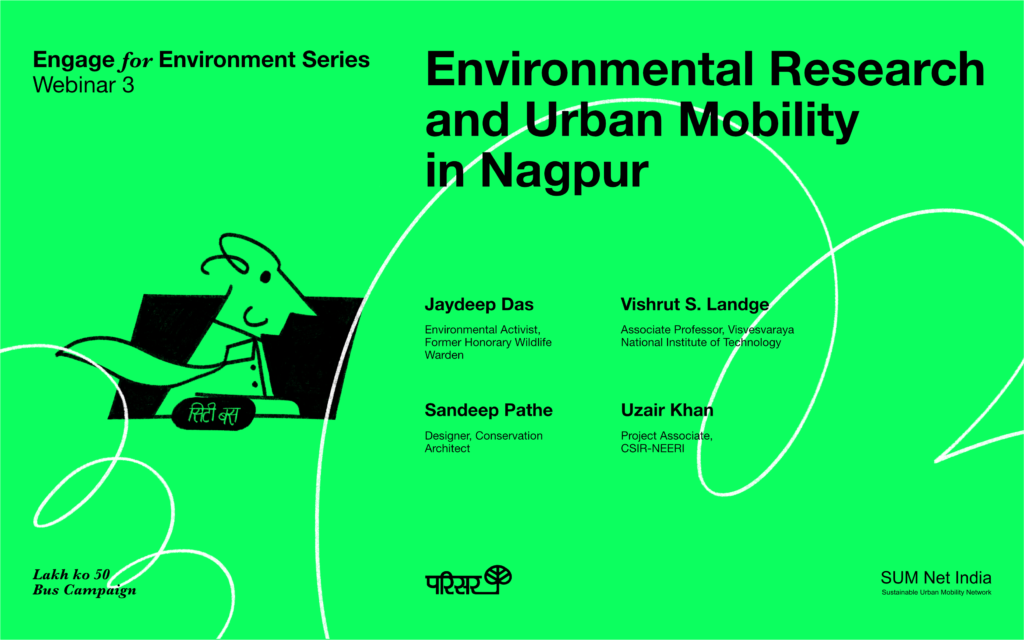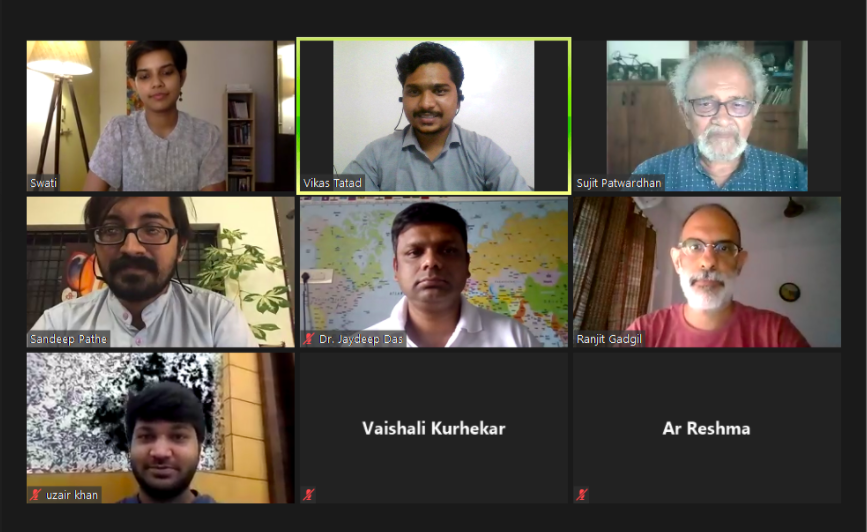A web roundtable was organised as part of Parisar’s multi-city webinar series titled ‘Engage for Environment: Environmental Research and Urban Mobility’ in Nagpur. Third in the series, this webinar continued the engagement with research scholars, academicians and environmentalists to explore how they understand the linkages between environment and urban mobility, and how this knowledge informs decision- and policy-making in Nagpur. This webinar series is part of a statewide campaign, ‘Lakh ko 50’ which demands a comprehensive program or policy by the Maharashtra State Government to ensure that the citizens in all the cities of the state are assured a good bus-based public transport system. The campaign highlights the need for at least 50 buses per lakh urban residents, a benchmark set by the Ministry of Housing and Urban Affairs (MoHUA).
The link between environment and urban mobility was explored through a myriad of issues like biodiversity, heritage, built environment, ecosystem, trees, flora and fauna and many other things by an amazing roster of people who were the discussants— Dr. Jaydeep Das, Environmental Activist and former Honorary Wildlife Warden, Associate Professor Vishrut S. Landge from Visvesvaraya National Institute of Technology, Sandeep Pathe, Designer and Conservation Architect and Uzair Khan, Project Associate at CSIR-NEERI. Through these connections, all the speakers talked about the impact of increasing motorization on Nagpur’s overall ecosystem and quality of life.

Expressing concern over the growing number of roads and flyovers to accommodate them, Dr. Landge commented on how this expanding network is solely for the purpose of traveling in the city and serves the needs of a few by endangering the biodiversity of the city because of deforestation and loss of green cover. “We must understand that increasing motorization is a concern also because of the need for parking it creates. Parking congests the roads and also puts pressure on the limited land to be used for vehicles” said Dr. Landge.
Young architect and designer Sandeep Pathe outlined the threat of urbanisation and motorization on the British-era railway station and more than 40,000 trees in the Ajni area. He delineated the numerous transport solutions proffered in Nagpur namely burgeoning flyovers, the expensive Nagpur Metro Rail, etc. and their subsequent failure to address the traffic woes in the city and the consequent rise in pollution. “The elevated metro station is empty in Nagpur but a city bus stand right below it is crowded and brimming with commuters which demands the question what kind of public transport is actually needed in the city”, elaborated Sandeep.
While sharing detailed data compiled by him on the number of trees that have been cut and are being cut down to accommodate the growing private vehicular traffic in Nagpur, Dr. Jaydeep Das revealed how the plantation along the roads and highways are mostly saplings in the name of trees. “All this mindless cutting of trees is leading to the deterioration of urban biodiversity in our city which was once known for it” added Dr. Das.

Uzair Khan significantly noted that there is a mismatch between the growth in the number of city buses and people’s income. He added, “If the bus services in the city are to be made efficient and affordable, they need to be planned taking into account the needs and travel patterns of the people in the city.” He also talked about the increasing concretisation, and cementing of roads in the city which is creating heat islands.
All the panelists called for the urgent need to leverage the skills and knowledge of the local educational and research institutions, experts, and academicians towards solving local environmental problems. Both the state and urban local bodies need to play an active role towards this end. Dr. Landge emphasised on the need for environment, transport and research to go hand-in-hand for liveable cities and better quality of life.
Mr. Ranjit Gadgil, Program Director of Parisar summarized the problem statements and solutions laid out by all the speakers and talked about the role that academic institutions can play in assisting the city corporation to prepare the Environment Status Report (ESR), an important tool for the governing body as well as the citizens’ which is both a source of information and education. As per the MMC‘s (Maharashtra Municipal Corporations) Act 1949, section 67 (A), it is mandatory for all the ULBs of the state of Maharashtra, to submit an annual ESR to the General Body.
Appreciating the importance of discussions like these, Sujit Patwardhan, the founder member and trustee of Parisar, thanked all the speakers for their valuable inputs and expressed that the ‘Lakh ko 50’ campaign will keep coming back to these city-specific learnings to further the demand for efficient bus services in all the 27 Municipal Corporations of Maharashtra.